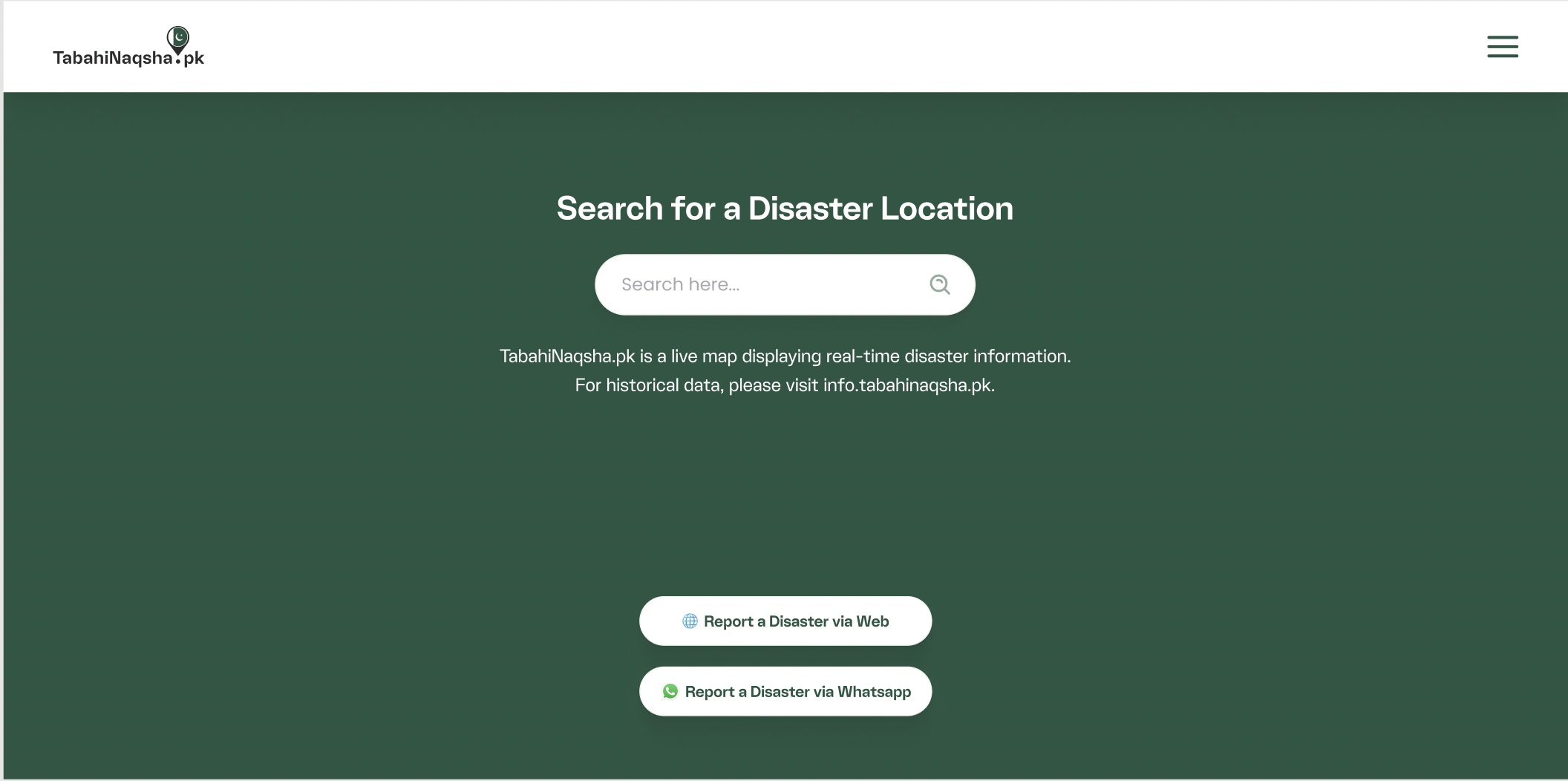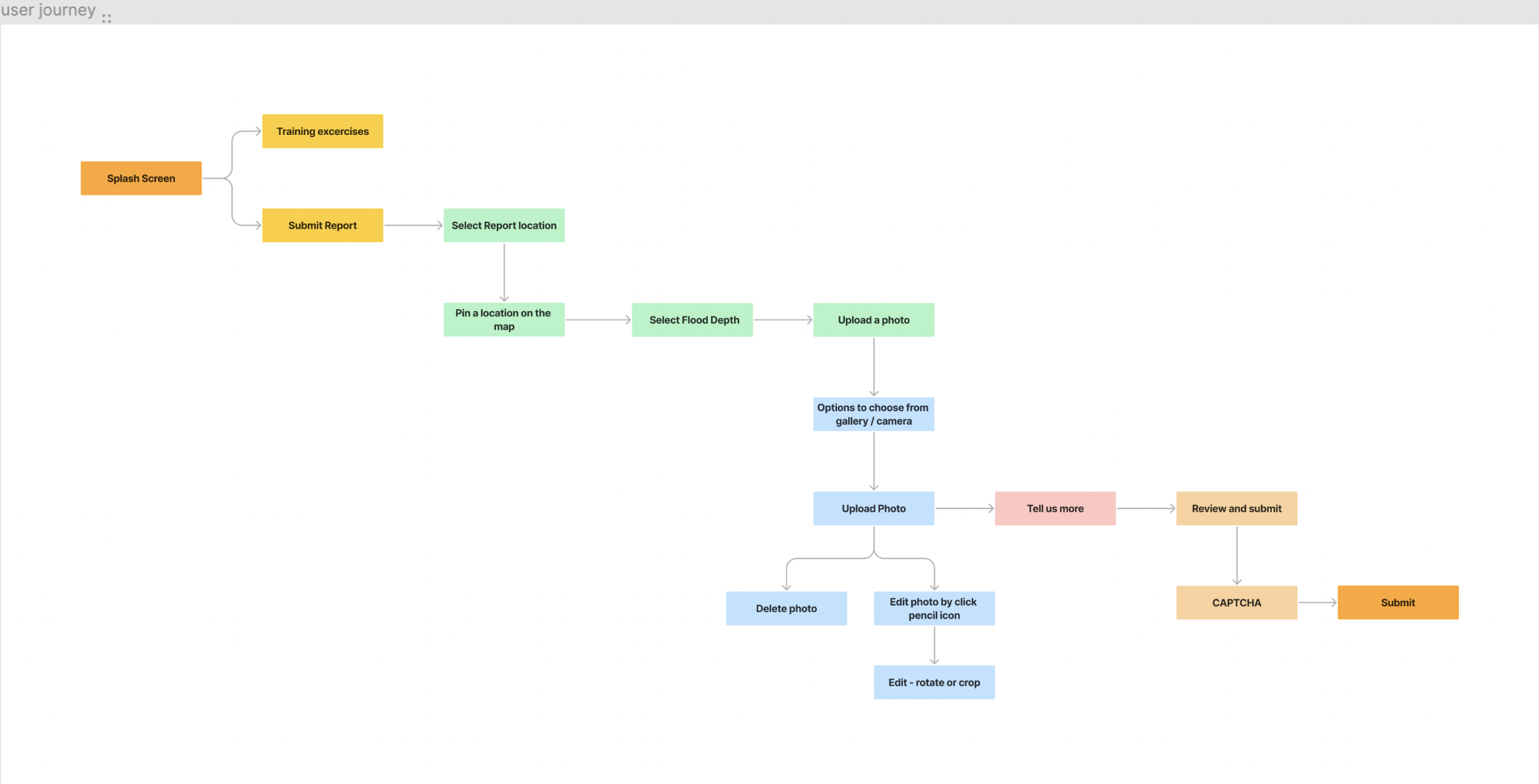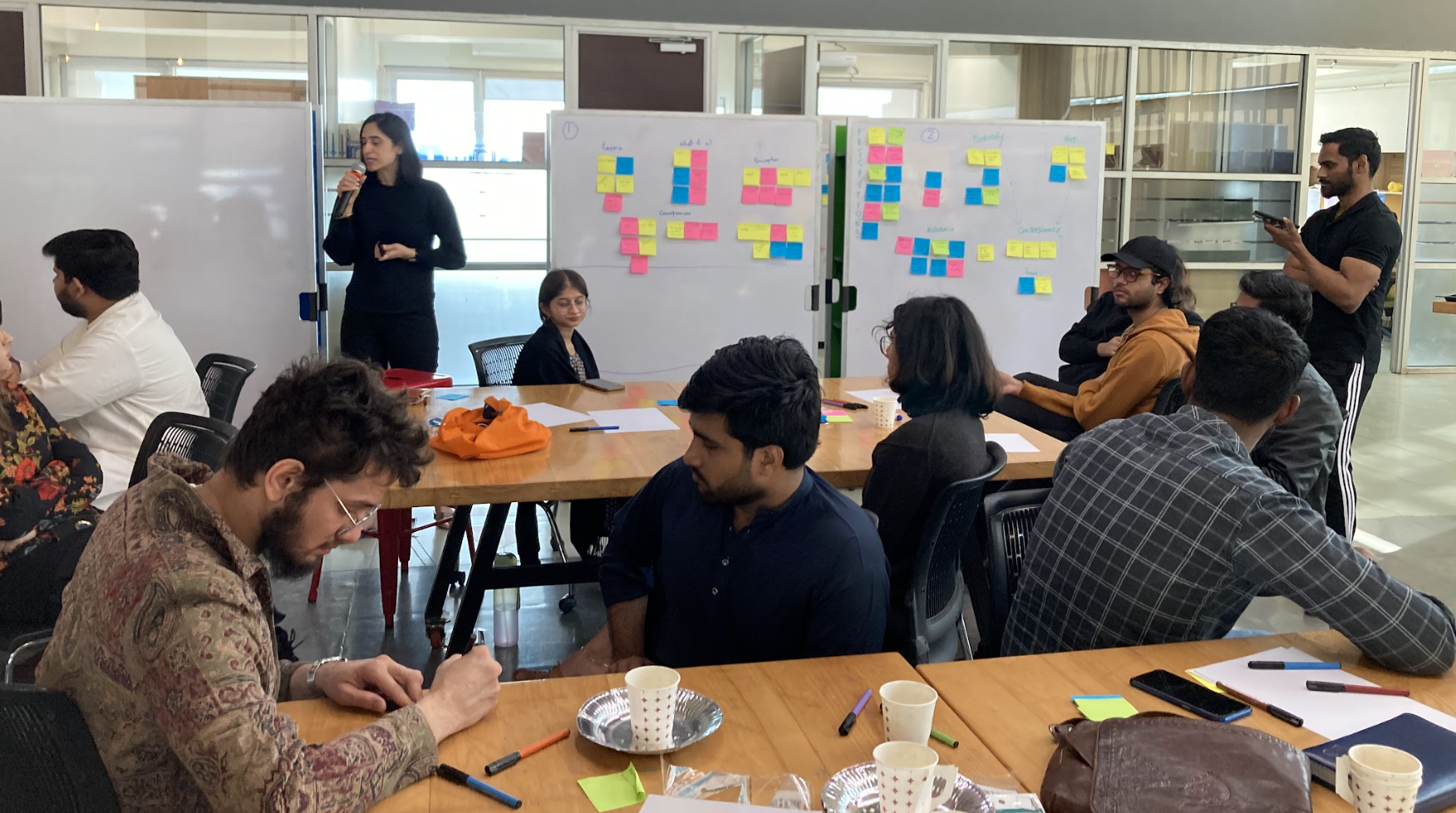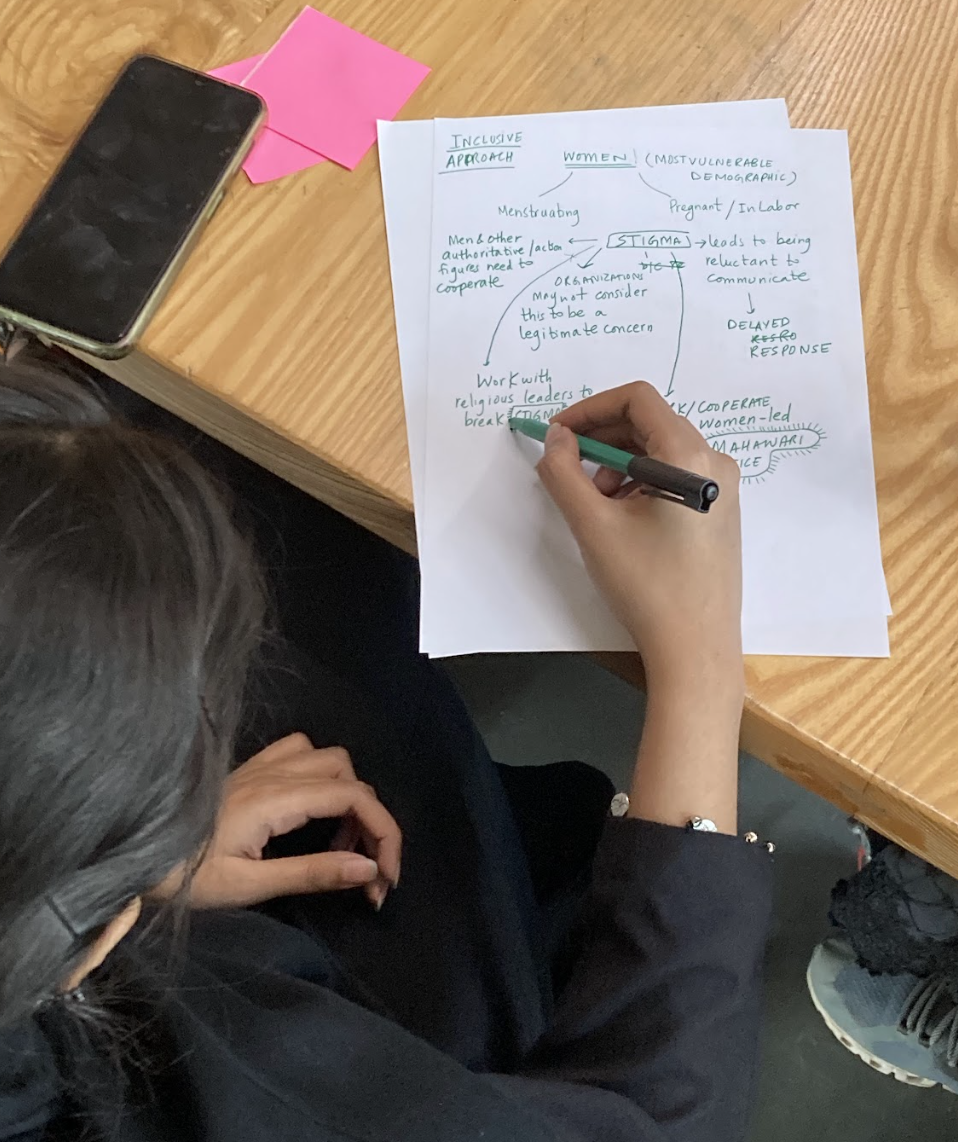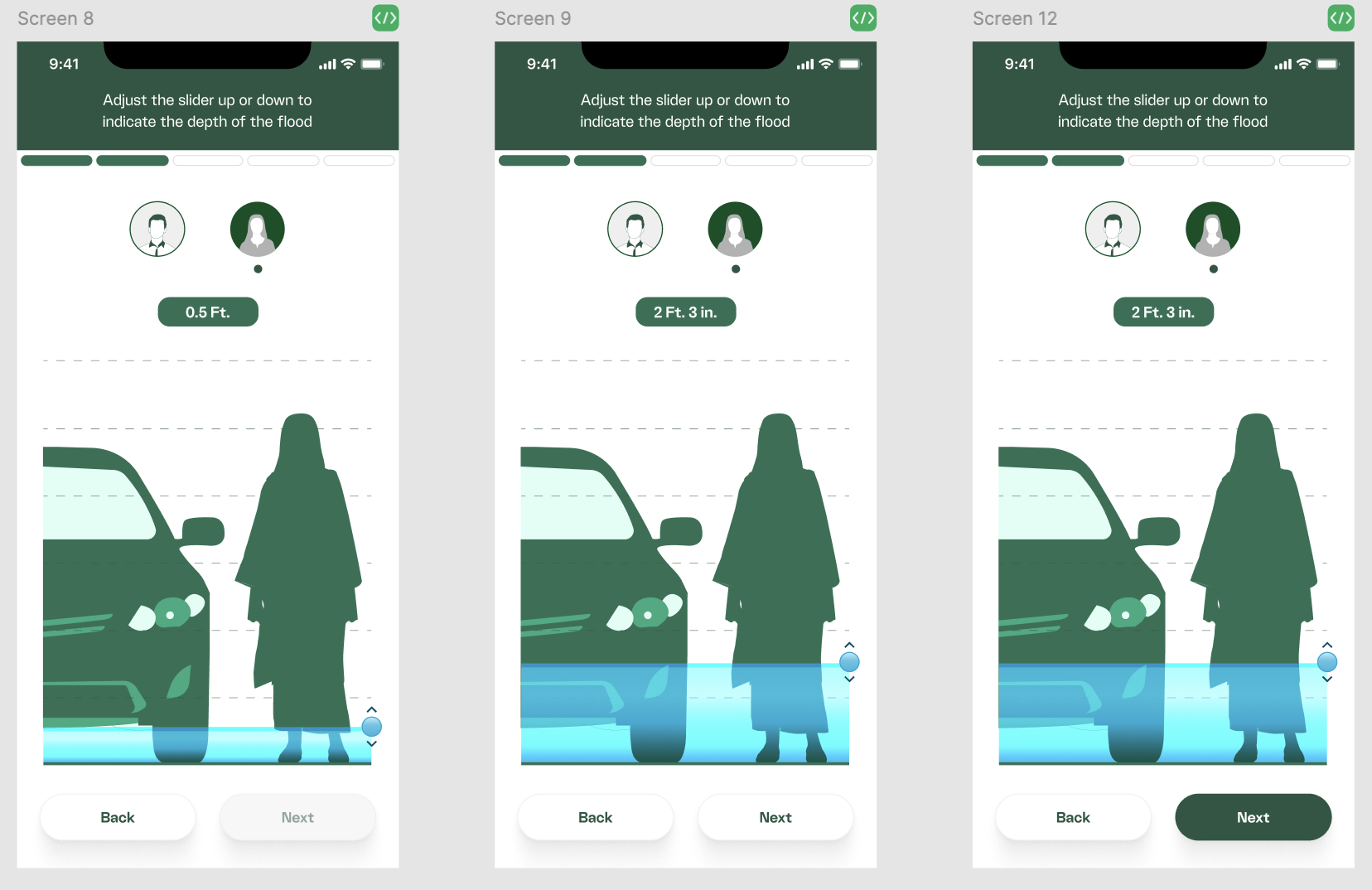
Building a user -centred disaster management platform.
Client & Timeline
Petabencanna + CESA Global
TabahiNaqsha.pk / Aafatinfo.pk
2023 - 2024
Challenge
Building on the successes of Peta Bencana in Indonesia and MapaKalamidad in the Philippines, Yayasen PetaBencana and re:arc SouthxSouth East Asia required implementation and adaptation of CogniCity OSS for Pakistan - AafatInfo.pk - the country's first disaster risk reduction app. This will provide a comprehensive overview of disaster events and empowers residents, humanitarian agencies, and government organizations to make informed decisions during emergencies.
The platform integrates spatial and crowdsourced data (citizen reports and social media) to provide citizens with real-time, human-level disaster updates.
Methodologies
Design Management
User Experience
Communications
Deliverables
UI/UX Research Insights Report
A report sharing insights generated for UI/UX localization of CogniCity OSS to adapt the global disaster response frameworks to local urban contexts. This contained details of research methodology and all engagements including workshops, interviews and co-design sessions with experts, government, NGO’s and local communities in Karachi.
Design System
A clear and detailed UI/UX design system with visual assets, fonts, colour palette compiled after usability studies and integrated in the pilot of the platform.
Beta launch of Platform
A beta-test of the platform with over 250 citizens across Karachi for floods.
Communications Strategy
A clear communications plan and strategy with all required visual assets and videos required for the platform launch.
Team
Director & Project Lead, Hira Zuberi
Researcher, Namra Khalid
Designer, Hafsa Ashfaque
Developer, Saad Ahmed
My Role
As the Co-founder & Director at TabahiNaqsha -
Directed the platform’s strategic development, overseeing cross-functional team operations
Managed end-to-end adaptation of platform to local infrastructure by conducting user-centred research and design.
Incorporated insights shared by over 250 citizens and field experts in Karachi in the design of the platform.
Led cross continental stakeholder management to keep product strategy aligned with international disaster management partners.
Conceptualised the UI/UX localization of CogniCity OSS informed by communities in Karachi
Impact
Implementation and adaptation of CogniCity OSS for Pakistan - AafatInfo.pk - the country's first disaster risk reduction app.
Beta Launch of Pakistan’s first hyperlocal disaster information platform that is aligned with local user needs and encourages adoption.
Successful partnerships formed with local NGO’s, educational institutions and government.
How might we create a contextual disaster reporting experience that is efficient and benefits all?
Key Activities :
+ Market Scan
Goals - To review the information that is published and available to understand the disaster management in the complex Pakistani/south asian context.
Outcomes - This resulted in insights that led to preparing for the co-creation and testing sessions with citizens.
+ Interviews & Co-Creation Workshops
Goals - To engage with stakeholders and understand the current experience and landscape of floods and disaster management + reporting in Pakistan.
Outcomes - 250+ citizens were engaged in person and online over 2 months. The participants included young professionals working in spatial design, geo-spatial analysis, climate activists, climate podcast anchors, climate reporters, community workers, disaster relief NGO workers, front line disaster responders and others
Sessions were divided into groups:
+Youth - Students & Young Professionals
+Experts - Frontline Workers & Climate Activists
+City Working Class
+Rural Working Class
+ Insights & Development
Goals - Translating research insights into key design ideas to modify and change the existing platform to suit the context.
Outcomes - Resulted in distilling the insights into 5-6 key features that were important to improve the user-experience and encourage adoption of the platform in the Pakistani context.
+ User Testing & Beta Launch
Goals - Test assumptions and develop the new features introduced in the platform.
Outcomes - Improved user experience and changes and updates in new features that had been introduced within the platform.
TabahiNaqsha or AafatInfo℠ (short for AafatInfo.pk) is a real-time disaster information-sharing web-app. By gathering, sorting, and displaying live reports of on-ground disaster conditions, we enable citizens to help each other stay informed and safe.
Key Research Insights :
Low to No Internet Connectivity
Internet Shutdowns - Internet shutdowns have become increasingly prevalent in Pakistan, with three nationwide instances of government-backed shutdowns occurring in the past year alone. These shutdowns have involved the suspension of mobile broadband services and the blocking of social media applications. Furthermore, numerous localized shutdowns have regularly occurred in specific regions across the country.
Remote Zones - No network infrastructure (one network only zone) - Many rural areas in Pakistan are completely cut off from the internet, never having had access to it, especially in Balochistan, Gilgit and Hunza. 25% of the country does not have 3G access (GSMA Intelligence, 2018)
Network Congestion - Often during disasters due to heavy load on data, network congestion occurs which leads to decrease in speed, and poor quality internet access.
Low Literacy
Pakistan has a literacy rate of 62.3% (Ministry of Federal Education and Professional Training, Government of Pakistan, 2024). However this number may not be entirely representative, as it includes individuals who are able to sign documents instead of using a thumbprint.
Low Cartographic Literacy
Limited understanding of maps and geographic information may hinder users' ability to interpret and use spatial data within the app effectively. In our interview we noted Karachi’s working class had a difficult time navigating through maps unless working in the driving field. Women notably had more difficulty than men. Even lower cartographic literacy is expected from rural areas.
Incomplete Internet Access - Specific App Packages
In Pakistan, a prevalent practice among rural residents and certain working-class individuals involves purchasing data packages tailored to provide access to only a limited selection (1 - 3) of apps. Notably, one of the apps included in these packages is almost invariably WhatsApp. Consequently, a considerable portion of the population finds themselves unable to access web browsers.
Low Trust in Official Authorities
There is widespread distrust in official authorities, particularly concerning donation initiatives despite the nation's high per capita donation rates. This skepticism stems from collective trauma due to past disasters and is exacerbated by instances of mismanagement and opportunism disguised as relief efforts. Politicians have been observed engaging in staged relief campaigns and questionable actions, while reports of aid diversion and misuse have further eroded trust.
Low Trust in INGOs
Unfortunately, during various natural disasters in Pakistan, instances have arisen where INGOs were implicated in child trafficking scandals in the Middle East. Moreover, perceptions of agenda-driven actions, lack of transparency, cultural insensitivity, dependency issues, perceived inefficiency, security concerns, and suspicions of political interference also contribute to the overall mistrust.
Privacy, Safety & Security Concerns
Fears of personal privacy invasion when submitting reports or sharing location information, especially in informal settlements. If their data is layered on top of drainage data it may be used as evidence in court to evacuate them.
Key Contradictions : Platform Ideation:
Community Generated Landmarks
Enable users to contribute and share localized landmarks or reference points that can be added to the map. Encourage the community to build a database of easily recognisable landmarks.
Automated Localised Descriptions - AI Powered Photo Recognition
Accompany the map interface with localized descriptions or instructions in commonly spoken languages (e.g., Urdu, Sindhi, Punjabi). Use simple and clear language to guide users on how to mark their location effectively. Integrating AI-powered photo recognition technology to automatically generate descriptions from the photos uploaded through the previous card.
Auto-detection and Suggestions
Implement a feature that automatically detects the user's current location using GPS.Provide location suggestions based on nearby landmarks, major roads, or popular places to help users quickly identify their position.
Offline Support
Recognise that internet connectivity may be inconsistent in certain areas. Allow users to mark their location offline and submit the report once they regain connectivity.
Voice Note Feature
Many individuals who are not proficient in writing and reading texts rely heavily on voice notes as their primary mode of communication. Integrating a feature that converts voice notes into text descriptions would be immensely beneficial. However, implementing such a feature poses challenges as regional language and dialect voice recognition software are currently unavailable.
Simultaneous Exaggeration & Underreporting
Exaggeration: The competitive environment fostered by social media, coupled with the community's tendency for exaggeration, poses significant challenges to the accuracy of information during crises. Further perception variability and also add to this. Language itself, ‘taknay se upar/ ghutne se upar/ sar se upar paani char gaya’ leads to exaggerations.
Underreporting: Feelings of ‘I don’t have the time to report,’ ‘What does it have for me,’ and threat to safety may lead to underreporting. Many have also gotten so used to flood related conditions that they perceive it as less significant now.
Spam Reporting
Trends have shown irrelevant or false information is often shared across platforms as pranks. At the worst, pornographic and violent images are also shared from untraceable IPs.
Sense of Responsibility Vs. Reporting Incentive
Amidst the strong sense of community and collective information-sharing observed during flooding events, the motivation for individual reporting on TabahiNaqsha.pk can vary significantly. While there is an innate drive to access information, the willingness to contribute information when they have already told the people they care about on WhatsApp and Facebook groups may not be as high.
